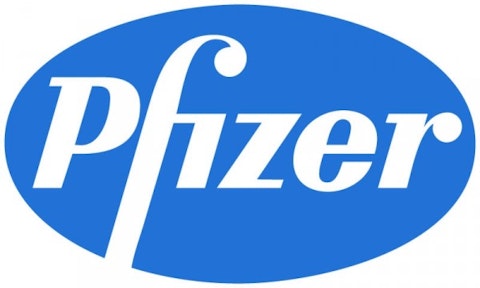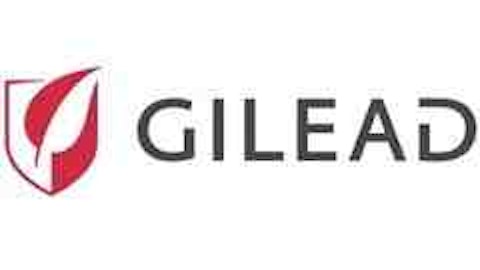Earnings season is a wrap for many of the brightest stars of the health care sector: Big pharma’s big disappointments and successes are in the books, and investors are looking ahead to the future. Patent expirations have been taking their toll on sales of some of the industry’s biggest blockbuster drugs lately, putting pharmaceutical firms on the defensive as they try to boost pipeline stockpiles and stave off revenue losses. With that in mind, how did five of big pharma’s biggest names grade out this earnings season?

After a great 2012, Pfizer Inc. (NYSE:PFE) has opened up 2013 with a bang. The company’s $11.85 billion sale of its nutrition business to Nestle last year has rewarded shareholders, as Pfizer reported fourth-quarter profit that more than quadrupled last year’s total. Earnings per share of $0.85 — drastically up from $0.19 a year ago — made investors happy, although adjusted EPS that removed one-time items fell slightly by $0.02 to $0.47; still, that beat analyst profit projections of $0.44 per share for the quarter.
All the talk now surrounds Pfizer’s recent debut of former animal health business Zoetis Inc (NYSE:ZTS) as a publicly traded company following its recent IPO, but Pfizer’s still dealing with issues of its own. The company faces plenty of generic competition for drugs — particularly blockbuster Lipitor, which lost patent protection last year — in what’s become an industrywide trend. However, with a massive pipeline of 87 drugs to bolster the future, Pfizer could make up for falling revenues, which declined 7% this past quarter, by scoring a few timely FDA approvals.
Ultimately, Pfizer could be one of the better-positioned companies for the future after it scored one of the industry’s best earnings reports, particularly as its rivals have struggled as of late.
Future imperfect: Merck & Co., Inc. (NYSE:MRK)
Fellow Dow Jones member Merck & Co., Inc. (NYSE:MRK) hasn’t had so much to cheer about recently despite a strong 2012. The company actually reported an earnings beat despite the negativity that’s surrounded it in past days; Merck’s earnings per share came in at $0.83, $0.02 higher than analysts projected, while revenue of $11.7 billion also beat expectations. Both fell from a year ago — and it’s the future, not the present, that has investors so concerned.
The company warned investors that generic competition will cut into 2013 profits as Merck continues to feel the pain from patent expirations, particularly on blockbuster drug Singulair. The company’s still got a handle on strong products for the future, such as blockbuster diabetes therapies Januvia and Janumet and fast-growing cervical cancer vaccine Gardasil — each of which posted strong double-digit sales growth this past quarter — but the caution wasn’t what shareholders wanted to hear.
Singulair sales flopped by 67% this past quarter — and by 30% for 2012 as a whole — showing just how bad the patent cliff is hurting Merck’s sales. With the company delaying its filing for FDA approval on promising osteoporosis drug odanacatib until 2014, the year ahead for Merck has become considerably tougher.
The pain of patent losses: Eli Lilly & Co. (NYSE:LLY) and Bristol Myers Squibb Co. (NYSE:BMY)
Generic sales have cut a wide swath across big pharma with the patent cliff, and Eli Lilly & Co. (NYSE:LLY) and Bristol Myers Squibb Co. (NYSE:BMY) felt the pain this quarter. The former’s still feeling the pain from the 2011 patent expiration of once-blockbuster drug Zyprexa, as the drug’s sales fell 49% in the fourth quarter to under $400 million — after at one point selling more than $5 billion annually. Eli Lilly’s earnings per share fell by $0.03 year-over-year to $0.74 for the quarter, with revenue also falling around 1%. Still, the company’s numbers did manage to beat estimates. Furthermore, Eli Lilly’s pipeline holds several promising therapies in oncology and diabetes that could help the stock’s recent run-up should any of them score FDA approval and would ease the loss of patent protection on blockbuster depression drug Cymbalta this December.
Bristol-Myers managed to boost earnings per share by 12% in a delight for investors — a good thing, too, since the company’s revenue fell by an ugly 23%, with an ungodly 38% fall in U.S. sales for the quarter. Like Eli Lilly, patent losses took a bite out of the company: Sales of Avapro and Plavix, each which recently lost patent protection, especially hurt, with Plavix revenue falling a ridiculous 97% for the quarter.
While Bristol-Myers has pipeline power for the future, particularly with the FDA’s approval of blood thinner Eliquis at the end of last year, both these companies have their work cut out for them overcoming serious blows to sales from patent losses.
Big pharma’s big loser: AstraZeneca plc (ADR) (NYSE:AZN)
Finally, we arrive at the biggest blow to investors this earnings season: AstraZeneca plc (ADR) (NYSE:AZN) . The company’s sales fell by 16% to $7.28 billion for the quarter, beating estimates but ending a poor year in which revenue plunged around 15% in all. It gets worse: Profit fell 8% for the quarter, still beating analyst projections, but the company’s net profit for the full year in 2012 dove by around 37%.
Compounding matters, AstraZeneca’s CEO doesn’t see relief in sight in 2013. Company Chief Executive Pascal Soriot predicted mid- to high-single digit percentage losses for revenue in 2013, with earnings falling “significantly more.” Soriot announced that internal development would key future growth for AstraZeneca, but with the company facing a sharp patent cliff of its own — schizophrenia blockbuster Seroquel lost patent protection last March, while third-leading seller Nexium and cholesterol-fighting drug Crestor following in 2014 and 2016, respectively — AstraZeneca may need to make a move fast in order to shore up its future.
Soriot said a large acquisition isn’t likely, but with AstraZeneca’s future in doubt, he may be forced to shake up the establishment.
Turbulence ahead for big pharma
Pfizer shareholders should feel good about the future, but none of these five big pharma players are running off to the races just yet. Generic competition and patent expirations continue to take their toll, from the biggest names like Lipitor and Singulair to the sledgehammer of losses that are smashing AstraZeneca’s future. This earnings season has given investors a valuable look into the future of these companies — and it’s a future worth watching, with plenty of ups and downs on the way.
The article 5 Big Winners and Losers From Earnings Season originally appeared on Fool.com and is written by Dan Carroll.
Fool contributor Dan Carroll has no position in any stocks mentioned. The Motley Fool has no position in any of the stocks mentioned.
Copyright © 1995 – 2013 The Motley Fool, LLC. All rights reserved. The Motley Fool has a disclosure policy.



